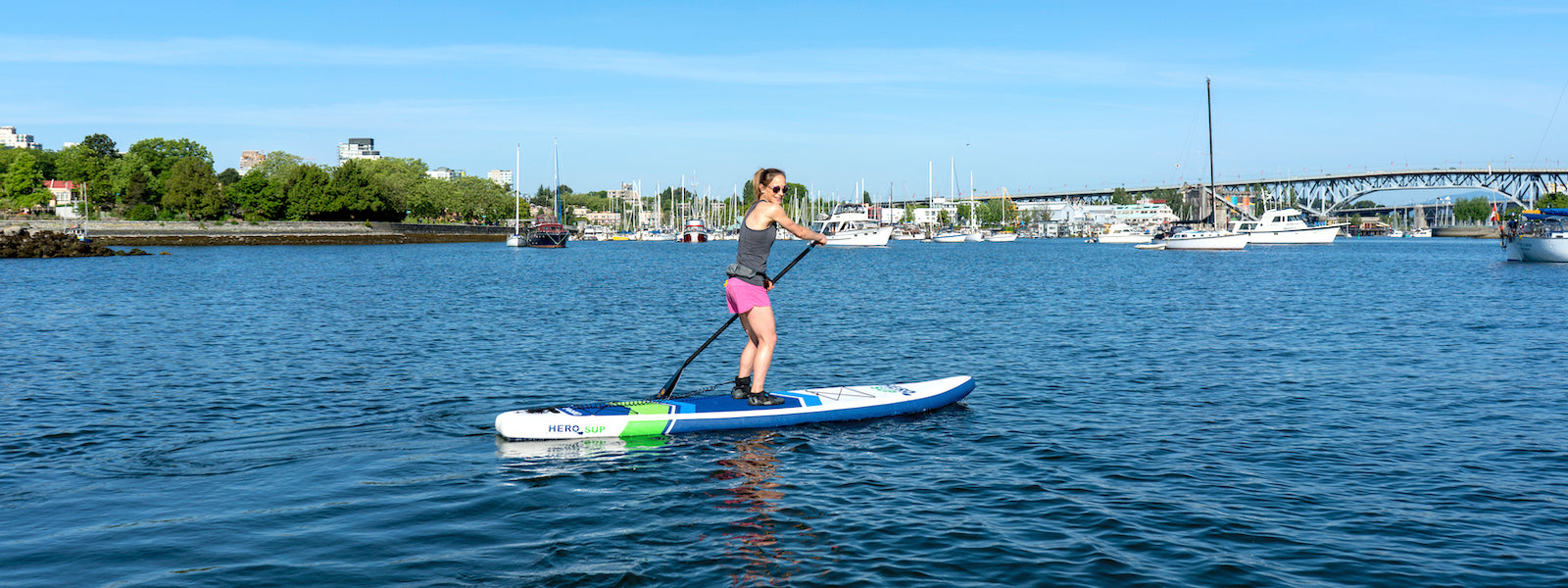How Paddle Boarding Benefits Your Mental Health
It probably comes as no surprise that paddle boarding is great for the body. It is an ideal form of exercise as it works your muscles while challenging your core at the same time.
However did you know that it is also extremely effective in helping to deal with stress and anxiety, depression, PTSD and trauma?
In a time when our bodies are often stuck in fight-flight mode with our adrenals working overtime trying to protect us, it is more important than ever to have a plan in place to help with mental health.
Most of us need help reducing our stress levels at the best of times but right now with everything going on in the world we might need a little extra help to stay calm and positive.
PADDLE YOUR STRESS AWAY

Paddle boarding provides a low impact, repetitive motion while deep breathing in nature.
The combination of this repetitive motion combined with breathing in fresh air while out on the water can very quickly get you into a zen state. The effects are amazing.
Doing this repetitive motion for a very short period of time will calm the body and decrease your levels of cortisol, the main stress hormone.
Whereas high impact sports can actually temporarily increase your cortisol level, a low impact and repetitive sport like paddle boarding will significantly decrease your cortisol level with only 30 minutes of paddling.
As you continue paddle boarding your body releases good chemicals that help your muscles and organs relax and increase blood flow to the brain.
The overall effect will have you amazed at how good you feel.
Any SUP will do but one of our most popular paddleboards for exercise is our Hero SUP Dynamo touring board. This ISUP flows so nicely through the water and really helps you get in the zone.
INCREASE MINDFULNESS

Another bonus to being out exercising on the water is that it forces you to be in the moment.
All of the mind chatter disappears as your brain focuses on those same repetitive paddling strokes while staying balanced on your board.
It can truly be a fantastic form of meditation.
You might notice you feel more connected to your body as you focus on each muscle group working.
Without even realizing it you will get into the zone. You will feel a deeper connection with yourself as well as with the water as you paddle with and against the flow.
Being in this mindful state will cause an automatic relaxation response in your body.
IMPROVE WELL BEING & HAPPINESS

When you exercise your heart rate increases and your body pumps more oxygen to your brain. A well-oxygenated brain is very important.
In fact multiple studies have shown that a well oxygenated brain helps to manage stress and anxiety as well as help ease depression.
During a low-impact exercise routine your body will release happy chemicals called endorphins.
These endorphins interact with receptors in your brain that reduce your perception of pain. Basically they cause you to feel happier and more positive.
It will also release other mood-enhancing chemicals such as serotonin and dopamine that stick around in your brain for a couple hours after you exercise.
So breathe deep while you are out there paddling and oxygenate that brain as much as possible. The effects are long lasting and totally worth it!
IMPROVED IMMUNITY

As a side benefit to all this great exercise, calmness and positivity is a stronger immune system. It is truly a win win!
Chronic stress will cause your autonomic nervous system to be overactive. This response to stress can cause a whole list of health symptoms and conditions and put your immune system at risk.
As you lower your stress hormones you give your immune system a chance to rebuild and fortify.
Consequently you are stronger to tackle whatever life brings you emotionally and physically.
HELP WITH DEPRESSION

Did you know that studies have shown that exercise can treat mild to moderate depression as effectively as antidepressant medication but with no side effects?
A recent study done by the Harvard T.H. Chan School of Public Health found that running for 15 minutes a day or walking for an hour reduces the risk of major depression by 26%.
On top of that, research shows that maintaining an exercise schedule can also prevent you from relapsing.
Your body releases endorphins while you are paddle boarding making you feel good and your brain will recognize new activity patterns that promote feelings of calm and well-being.
This can be a welcome break in the cycle of fighting those negative thoughts that fuel depression.
EVEN A LITTLE HELPS

Even a little time out exercising in nature is better than nothing. One of the great things about stand up paddle boarding is that once you have your board it's free to go out each and every time.
As your skills improve you will notice a stronger overall sense of well-being as you become more comfortable with your movements and with the environment.
Clear your head, focus on your muscles working, feel the flow of water under your board, tighten your core and reap all the wonderful benefits that stand up paddling offers.
You’d be hard pressed to find any paddle boarder that doesn’t have a big smile on their face after a little time out on the water.
Stay well, breathe deep and happy paddling!
Also in KNOWLEDGE

WHAT MUSCLES DO YOU USE WHEN PADDLE BOARDING?

10 Most Common Beginner Paddleboarding Mistakes
Brand new paddle boarders and even some notice paddlers tend to make a lot of rookie mistakes that can hinder their paddling progress. That’s totally okay!



